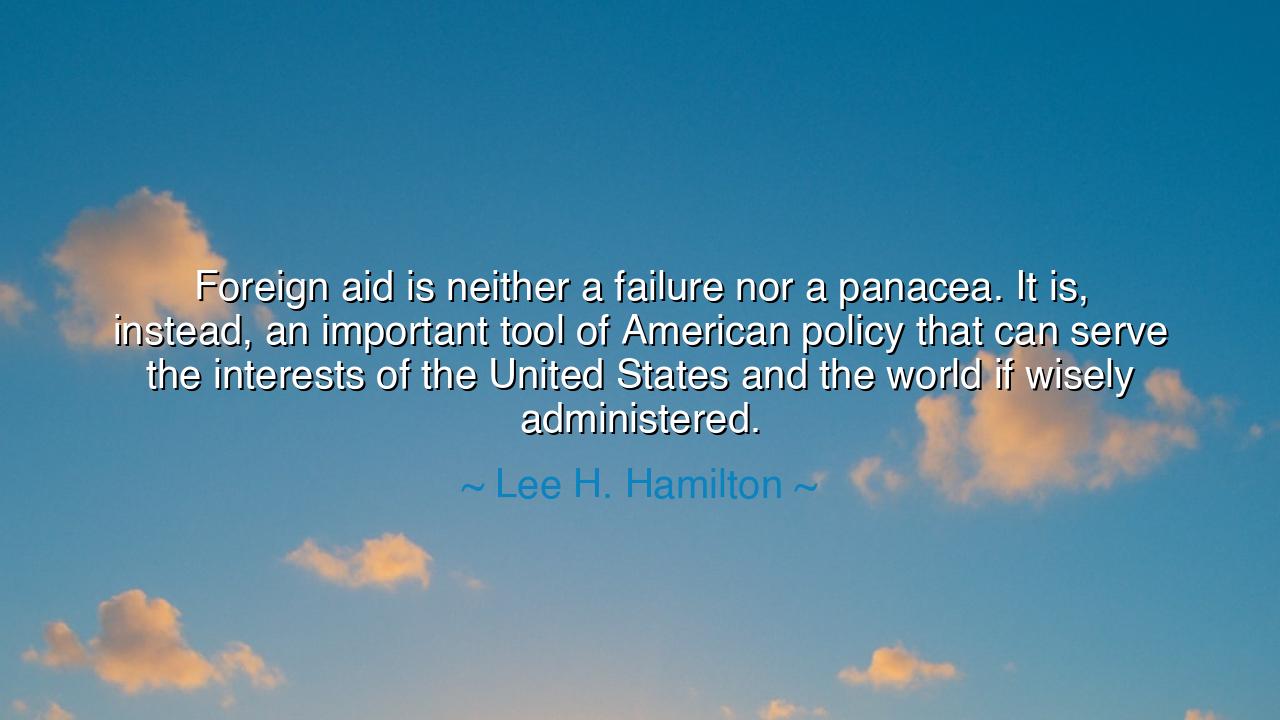
Foreign aid is neither a failure nor a panacea. It is, instead
Foreign aid is neither a failure nor a panacea. It is, instead, an important tool of American policy that can serve the interests of the United States and the world if wisely administered.






Host: The atmosphere is thoughtful, as Jack and Jeeny consider Lee H. Hamilton's nuanced perspective on foreign aid. The quote invites a conversation not just about international assistance, but about the complex balance of policy, ethics, and national interests. Jack leans forward, his expression reflecting a deeper engagement with the statement.
Jeeny: "Lee H. Hamilton once said, 'Foreign aid is neither a failure nor a panacea. It is, instead, an important tool of American policy that can serve the interests of the United States and the world if wisely administered.' It’s such a well-rounded way to think about foreign aid, don’t you think? It’s neither the ultimate solution nor a complete failure, but a tool that needs to be used carefully. What do you think he’s really trying to convey here?"
Jack: "I think Hamilton is trying to address the complexity of foreign aid. Too often, it’s portrayed as either something that solves all problems or something that’s wasted, and neither view captures the full picture. The reality is, foreign aid can be incredibly impactful, but it’s not a silver bullet—it’s a tool in a broader strategy, one that requires careful planning, oversight, and understanding of the local context." He pauses, considering further. "Foreign aid can serve American interests, but it can also address global challenges, like poverty, health crises, or conflict. But only if it’s managed well."
Jeeny: "Yes, it’s all about the intent behind the aid and how it’s implemented. If done thoughtfully, foreign aid can support development, promote stability, and build relationships between countries. But if it’s mishandled, it can lead to dependency, corruption, or unintended consequences. Hamilton’s point is that it’s not inherently bad or good; it’s about how it’s administered and the strategy behind it." She leans in, her voice gaining momentum. "It’s not just about throwing money at a problem—it’s about addressing root causes, working with local governments, and being strategic about the long-term impact."
Jack: "Exactly. And I think what Hamilton is highlighting is the idea that foreign aid isn’t just about charity—it’s also about foreign policy. It’s about building alliances, promoting stability, and sometimes advancing national security interests. It can help foster relationships that are beneficial for both the donor and the recipient country. The challenge, of course, is balancing those interests with genuine support for the people who need it the most." He pauses, thinking. "Foreign aid needs to be about more than just political influence—it needs to have real, sustainable outcomes that improve the lives of people in the recipient countries."
Jeeny: "I love that distinction. It’s not just about serving one’s own interests—it’s about finding ways to create mutual benefit. When foreign aid is used wisely, it can strengthen international partnerships, foster peace, and help lift people out of poverty. But it’s not always easy. There’s a fine line between providing meaningful support and creating dependence or reinforcing existing power dynamics." She pauses, her voice becoming more serious. "That’s why it’s so important for foreign aid to be accountable—to ensure it’s used for its intended purpose and not diverted for political or strategic gains."
Jack: "Right. The effectiveness of foreign aid comes down to how well it’s aligned with the needs of the recipient country. It's not enough to just send money or resources. There needs to be collaboration, a clear understanding of the goals, and a focus on empowering the local community to become self-sufficient. The best kind of aid doesn’t create long-term dependency—it creates sustainable development and resilience." He looks at her thoughtfully. "It’s about partnership, not paternalism."
Jeeny: "Exactly. The goal should always be to help countries build their own capacity to manage their issues, whether it’s through education, infrastructure, or governance. The aim isn’t to provide a temporary fix—it’s to create lasting change that allows people to thrive independently." She smiles, her tone hopeful. "Foreign aid, when done well, can be a powerful force for good, but it has to be approached with care and long-term vision."
Host: The room feels quiet now, as Jack and Jeeny sit in reflective understanding of Hamilton's perspective. Foreign aid is not a simple issue, and it’s not a one-size-fits-all solution. It’s a tool that, if wisely used, can benefit both the United States and the rest of the world—fostering relationships, promoting development, and addressing global challenges. But it requires careful administration, thoughtful strategy, and a commitment to sustainable change.
As the conversation continues, the understanding deepens that foreign aid, when implemented wisely, is not just a matter of charity, but of diplomacy, empowerment, and long-term global partnerships. The balance between national interests and the well-being of recipients is key to its success.






AAdministratorAdministrator
Welcome, honored guests. Please leave a comment, we will respond soon